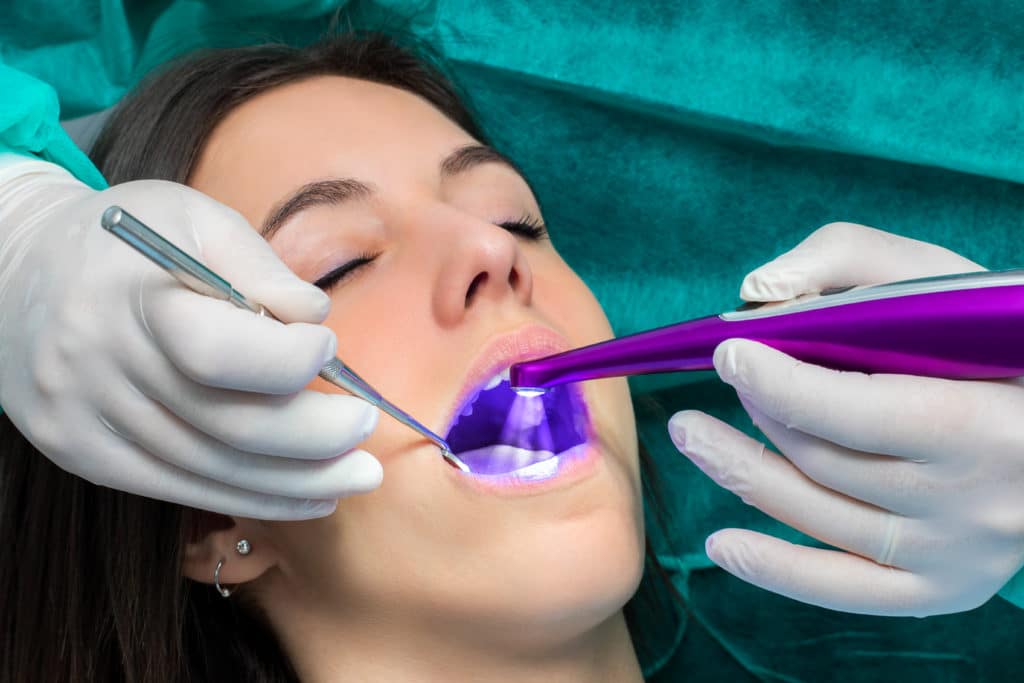It is well known that brushing and flossing for two minutes twice a day dramatically reduces tooth decay and cavities. For many, however, this is not enough and cavities still form. Dental sealants have become an effective additional method for reducing decay and cavities. But what are dental sealants? How do they prevent cavities? Are they safe? We’ll answer these questions.
Everything You Need to Know About Dental Sealants
How Do Dental Sealants Work?
Dental sealants have been especially effective for children who are first developing good oral hygiene habits and can easily miss a few brushings. Even the most well-intended children—and adults, too—are sometimes rushed out the door in the morning before they can brush, or are so exhausted at night that they forget. This allows bacteria to build up on teeth and multiply. These bacteria consume sugars from foods and drinks and produce acid. This acid eventually creates holes in the teeth, called cavities, which expose the teeth’s sensitive inner tissues. If this problem isn’t addressed, it can cause infections, gum disease and many other problems.
Dental sealants provide an additional layer of protection by covering your teeth with a thin, clear layer of resin. This means bacteria build up and produce acid on the resin layer, but not on your teeth. You still have to brush and floss regularly to keep your teeth healthy. But, you will have an extra layer of protection to block bacteria and acid. This can prevent the need for more expensive corrective measure in the future, such as dental implants to replace decayed teeth.
Are Dental Sealants Effective?
Tooth decay is a serious problem throughout the world, and the U.S. is no exception. According to the CDC, 20% of children ages 5 to 11, 13% of adolescents 12 to 19, and 27% of adults have untreated tooth decay. Over 90% of adults have at least one cavity.
Dental sealants go a long ways towards reducing these numbers. Dental sealants provide protection for up to four years. The CDC reports that “sealants protect against 80% of cavities for 2 years and continue to protect against 50% of cavities for up to 4 years.”
Who are Dental Sealants For?
Dental sealants are an effective option for any adults or children who want to better protect their teeth. Since children tend to have more sensitive teeth and it’s more important to protect these teeth early on, dental sealants are often used for children’s teeth. This may include baby teeth for children 10 years and under, or adult teeth for adolescents. Usually, only the back molars are sealed, since these teeth have more uneven spaces for bacteria to hide.
Are Dental Sealants Safe?
The first thing that parents want to know before scheduling dental sealants for their children is whether or not they are safe. Sealants are made in several different ways, one of which is a plastic polymer. This raises questions about BPA exposure. However, BPA exposure from plastic polymer sealants is extremely small. In fact, the American Dental Association (ADA) found that we are all exposed to more BPAs simply by breathing air than we would be from having dental sealants.
How Are Dental Sealants Applied?
Dental sealants are applied by a dentist during an appointment. This process is completely painless and only takes a few minutes for each tooth. First the tooth is cleaned, then a solution is applied to help the sealant bond to the tooth. Then the sealant is applied. Finally, the dentist will shine a light over the tooth with the sealant to harden the substance and ensure it bonds to the tooth. Then, the process is complete and your tooth is sealed.
Does Dental Coverage Cover Sealants?
In many cases, dental coverage will cover sealants, especially for children. Since sealants are a preventative measure and have been shown to decrease the incidence of cavities, this actually saves the dental insurance provider money in the long run. Before making an appointment, ask your dental insurance provider if sealants are covered. Or, ask your dental office if they can check for you.
Dental sealants are becoming very popular, and the evidence proving their effectiveness is compelling. As this simple, yet effective process becomes more widely used, tooth decay and cavities in both adults and children may decrease drastically.

